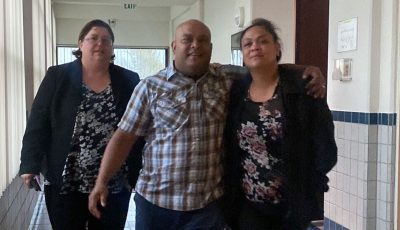‘CW permit issues not affecting CHC’s daily operation’
Despite a few denials and some delays in processing some contract workers’ CW permits, the public hospital’s daily operation continues to function uninterrupted.
Commonwealth Healthcare Corp. CEO Esther L. Muña told Saipan Tribune that only a very small fraction of their more than 100 CW permit holders have encountered delays in the processing of their papers.
Muña said the corporation has a total of 120 contract workers, mostly nurses hired from the Philippines.
Pursuant to federal immigration rules, CW holders whose permits have expired or their applications are denied must stop working until a new permit is approved.
Muña said the corporation strictly adheres to this guideline and that only three to four staffers have been taken off the floor for this reason.
“We’ve done it maybe in three or four of our staff. We have to take them off the floor and stop them from working. In cases like this, we’re closely working with Kilili’s office [Delegate Gregorio Kilili C. Sablan] to help us expedite the processing,” said Muña.
She disclosed that CHCC tries to submit CW papers within 90-day periods. However, because of unexpected RFEs, or requests for further evidence by the USCIS, this delays the processing for certain applications, which is beyond the corporation’s control.
“We try to submit in 90 days but sometimes RFEs come close to the expiration already,” she said, adding that those employees who were ordered stop working are placed on administrative leave.
In cases of certain positions left temporarily vacant by CW holder who are stopped from working, Muña said there’s no choice but to incur overtime for other staff.
However, Muña pointed out that “we’re not stopping operation of certain clinics or units at the hospital.”
Strategic plan
The CW program was implemented in the CNMI in 2011. For Muña, the three-year window from 2011 to 2014 is not enough time to plan on how nonresident workers will be adequately replaced in their positions, especially at the lone public hospital on island.
But with the recent decision of the federal government to extend the program until 2019, Muna is optimistic that CHCC can find the right amount of manpower until this deadline.
“We have to plan and make sure it’s in the budget. This five-year extension [of the CW program] will be part of the hospital’s strategic plan,” said Muña, adding that this plan is currently being worked on.
She said the corporation, on the third year of the extension period, would probably begin sponsoring a number of CW nurses with H1-B visas. Another batch of them, she said, may be processed in the fourth year of the extension.
The idea, Muña said, is for the CHCC not to be hit by a one-time large fee for H1-B visa applications.
Saipan Tribune learned that CHCC is currently sponsoring H1-B applications for at least two critical positions at the hospital, pursuant to the requirements of the U.S. Centers for Medicare and Medicare. These positions are for the infection control and quality control programs, both of which are occupied by CW holders.
If proper planning is enforced, Muña is confident that CHCC can produce seasoned nurses within the allotted five-year timeframe.
In next five years, Muña said, there will be a need to train local citizens to become nurses—a profession she described as rewarding and sustainable. She also assured CHCC’s continued partnership with the Northern Marianas College’s nursing program and the Saipan Southern High School’s nursing assistant program.
Along with the effort to sponsor staff with H1-B visas, Muña is convinced that adequate staffing will be kept and maintained at CHC.



























